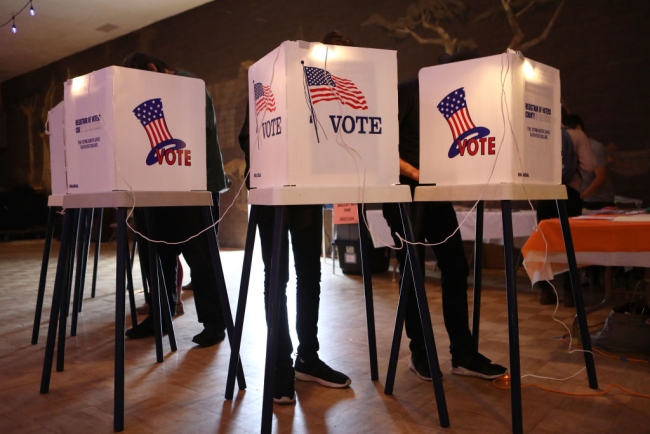You have /5 articles left.
Sign up for a free account or log in.

Voters decided measures that would bring changes to state governing boards.
Mario Tama
Lost in the drama and angst of the presidential election on Tuesday, nearly three-fourths of voters in North Dakota rejected a state ballot measure that would have almost doubled the size of that state’s higher education commission.
But with about a third of the votes yet to be counted early this morning, voters in Nevada were split over a measure that would strip the state’s Board of Regents of its constitutional autonomy, paving the way for legislators to make reforms like beginning to elect members to the higher education governing board.
In New Mexico, about two-thirds of voters supported another measure authorizing the state to issue and sell $156.4 million in higher education bonds to fund capital improvement projects, including the construction of a new College of Nursing and Population Health Building on the University of New Mexico’s Albuquerque campus.
Meanwhile, Republicans picked up a governor's seat in Montana. Republican congressman Greg Gianforte defeated Democratic lieutenant governor Mike Cooney in a race that had been considered a toss-up to replace Democratic governor Steve Bullock, who lost his bid for the Senate.
In a year when higher education was not a major issue in any gubernatorial race, neither mentioned it in their campaign platforms.
Incumbent Republican governors Eric Holcomb of Indiana; Mike Parson of Missouri; Chris Sununu of New Hampshire; Doug Burgum of North Dakota; Phil Cox of Vermont; and Jim Justice of West Virginia all won re-election.
Republicans also retained the governorship in Utah. Republican lieutenant governor Spencer Cox defeated University of Utah law professor Chris Peterson, a Democrat, to replace Republican governor Gary Herbert, who did not run for re-election.
Democratic incumbent governor John C. Carney Jr. won re-election in Delaware, as did Washington State governor Jay Inslee, and North Carolina’s Roy Cooper.
Nevada's measure would strip a provision in the state’s 1864 constitution, which gave the regents authority to manage and control the funds of its state universities. Lawmakers had said the constitutional provision prevented the Legislature from reforming the system.
North Dakota's measure would have increased the number of members on the state Board of Higher Education, created in 1939, from eight to 15. Proponents had said expanding the size of the board would give members more time to delve into issues and prepare the system for the future.
However, the state’s Republican governor, Doug Burgum, preferred a different approach, creating separate boards for research institutions and for the rest. His political action committee sent out mailers opposing the measure.








